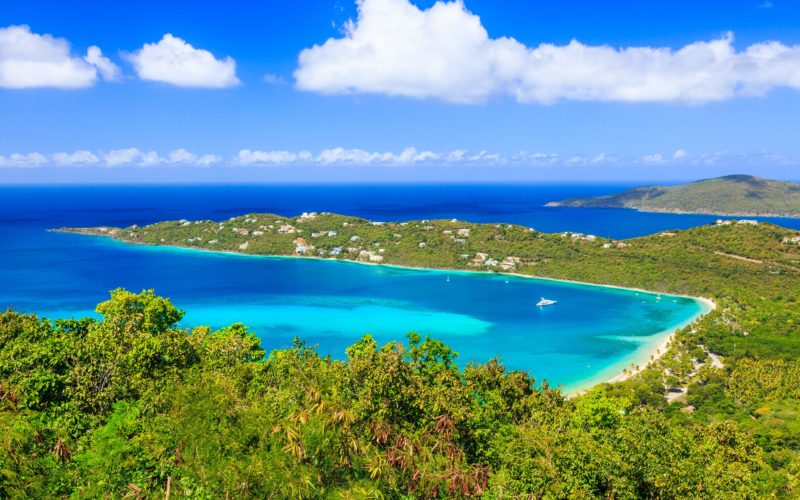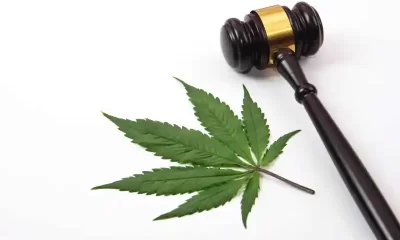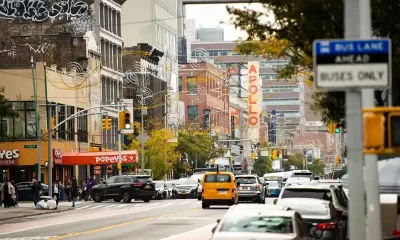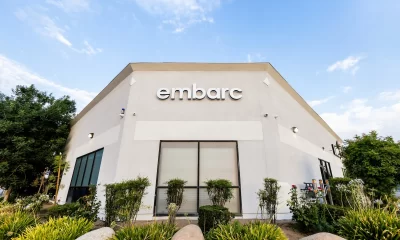Business
Virgin Islands Inches Closer to Adult-Use Cannabis, Expungements

Two bills were introduced that would legalize adult-use pot and expunge prior cannabis convictions.
Cannabis remains a hot button issue with politically-driven fanfare in the U.S. territory of the Virgin Islands. Two bills were introduced in the Virgin Islands on Oct. 24: One that would legalize cannabis for adult use and another that would expunge eligible cases of cannabis convictions.
Bill No. 21-0160 would legalize cannabis for adults 21 and over, and Bill No. 21-0137 would pave a way to expunge eligible cannabis convictions. After at least two previous attempts, government officials continue to push forward a workable bill.
Both bills were sponsored by Sen. Janelle Sarauw, who has been working on cannabis reform for some time. “It has been a very cumbersome process to get these bills to where they are today,” she wrote in a press release, which she also posted on Facebook, referring to past promises to get legislation going on the islands.
“Although there have been many politically driven false narratives about this cannabis legislation, I am proud of the work done to ensure that locals and minorities are not locked out of the industry and have an opportunity to participate in the economic potential of the industry — from farming, to dispensaries, to incentives for boutique labs, and micro energy providers,” Sarauw wrote.
“To ignore those lessons would be foolish,” Sarauw continued. “As a political scientist, but most importantly as an elected representative of the people, it is my job to do the due diligence to protect the masses and the best interest of our residents by creating equity in opportunity.”
The 69-page legalization bill covers just about any provision that you’d expect in a U.S. state bill. Under the legalization bill, an Office of Cannabis Regulation (OCR) would issue business licenses, oversee the industry, and set rules on advertising, packaging, and labeling. Edibles would be capped at 100 mg THC with 10 mg doses. Licensing fees would be imposed and a potential 50 cent per gram tax would be imposed on cultivators who sell cannabis to other licensees. The bill would include several equity components.
Under the expungement bill, people with past cannabis convictions can petition the courts to clear convictions for violations of up to two ounces of cannabis.
On Aug. 10, the V.I. Cannabis Advisory Board (VICAB) in the U.S. Virgin Islands unanimously approved draft regulations for the territory’s medical cannabis program. On Aug. 12, the Office of Cannabis Regulations posted the draft publicly. Long story short, the timeline didn’t adhere very well. Gov. Bryan’s administration was blamed by Sen. Sarauw for delaying the rollout of medical cannabis earlier on the islands.
Virgin Islands Governor Albert Bryan Jr. proposed an earlier version of the Cannabis Use Act in 2019, and introduced another version in 2020. Recently, Bryan’s re-election campaign fired back and slammed Sen. Sarauw for failing to fulfill promises to legalize cannabis, which she said in 2021. But it was the pressure put on by the governor that may have contributed to Sen. Sarauw’s recent actions to release the new pieces of legislation.
Sen. Sarauw herself and fellow candidate Sen. Kurt Vialet, who is against cannabis legalization, are both running to de-seat Gov. Bryan and Lt. Gov. Tregenza Roach in the upcoming election on November 8.
The Virgin Islands is a hotbed for Caribbean music like reggae, so it’s safe to say a lot of tourists go there to smoke. But despite an active medical cannabis program, tourists are warned that public consumption of cannabis is still forbidden in the Virgin Islands. Even with a medical cannabis card, you can not smoke weed in any public space.
Source: https://hightimes.com/news/virgin-islands-inches-closer-to-adult-use-cannabis-expungements/
Business
New Mexico cannabis operator fined, loses license for alleged BioTrack fraud

New Mexico regulators fined a cannabis operator nearly $300,000 and revoked its license after the company allegedly created fake reports in the state’s traceability software.
The New Mexico Cannabis Control Division (CCD) accused marijuana manufacturer and retailer Golden Roots of 11 violations, according to Albuquerque Business First.
Golden Roots operates the The Cannabis Revolution Dispensary.
The majority of the violations are related to the Albuquerque company’s improper use of BioTrack, which has been New Mexico’s track-and-trace vendor since 2015.
The CCD alleges Golden Roots reported marijuana production only two months after it had received its vertically integrated license, according to Albuquerque Business First.
Because cannabis takes longer than two months to be cultivated, the CCD was suspicious of the report.
After inspecting the company’s premises, the CCD alleged Golden Roots reported cultivation, transportation and sales in BioTrack but wasn’t able to provide officers who inspected the site evidence that the operator was cultivating cannabis.
In April, the CCD revoked Golden Roots’ license and issued a $10,000 fine, according to the news outlet.
The company requested a hearing, which the regulator scheduled for Sept. 1.
At the hearing, the CCD testified that the company’s dried-cannabis weights in BioTrack were suspicious because they didn’t seem to accurately reflect how much weight marijuana loses as it dries.
Company employees also poorly accounted for why they were making adjustments in the system of up to 24 pounds of cannabis, making comments such as “bad” or “mistake” in the software, Albuquerque Business First reported.
Golden Roots was fined $298,972.05 – the amount regulators allege the company made selling products that weren’t properly accounted for in BioTrack.
The CCD has been cracking down on cannabis operators accused of selling products procured from out-of-state or not grown legally:
- Regulators alleged in August that Albuquerque dispensary Sawmill Sweet Leaf sold out-of-state products and didn’t have a license for extraction.
- Paradise Exotics Distro lost its license in July after regulators alleged the company sold products made in California.
Golden Roots was the first alleged rulebreaker in New Mexico to be asked to pay a large fine.
Source: https://mjbizdaily.com/new-mexico-cannabis-operator-fined-loses-license-for-alleged-biotrack-fraud/
Business
Marijuana companies suing US attorney general in federal prohibition challenge

Four marijuana companies, including a multistate operator, have filed a lawsuit against U.S. Attorney General Merrick Garland in which they allege the federal MJ prohibition under the Controlled Substances Act is no longer constitutional.
According to the complaint, filed Thursday in U.S. District Court in Massachusetts, retailer Canna Provisions, Treevit delivery service CEO Gyasi Sellers, cultivator Wiseacre Farm and MSO Verano Holdings Corp. are all harmed by “the federal government’s unconstitutional ban on cultivating, manufacturing, distributing, or possessing intrastate marijuana.”
Verano is headquartered in Chicago but has operations in Massachusetts; the other three operators are based in Massachusetts.
The lawsuit seeks a ruling that the “Controlled Substances Act is unconstitutional as applied to the intrastate cultivation, manufacture, possession, and distribution of marijuana pursuant to state law.”
The companies want the case to go before the U.S. Supreme Court.
They hired prominent law firm Boies Schiller Flexner to represent them.
The New York-based firm’s principal is David Boies, whose former clients include Microsoft, former presidential candidate Al Gore and Elizabeth Holmes’ disgraced startup Theranos.
Similar challenges to the federal Controlled Substances Act (CSA) have failed.
One such challenge led to a landmark Supreme Court decision in 2005.
In Gonzalez vs. Raich, the highest court in the United States ruled in a 6-3 decision that the commerce clause of the U.S. Constitution gave Congress the power to outlaw marijuana federally, even though state laws allow the cultivation and sale of cannabis.
In the 18 years since that ruling, 23 states and the District of Columbia have legalized adult-use marijuana and the federal government has allowed a multibillion-dollar cannabis industry to thrive.
Since both Congress and the U.S. Department of Justice, currently headed by Garland, have declined to intervene in state-licensed marijuana markets, the key facts that led to the Supreme Court’s 2005 ruling “no longer apply,” Boies said in a statement Thursday.
“The Supreme Court has since made clear that the federal government lacks the authority to regulate purely intrastate commerce,” Boies said.
“Moreover, the facts on which those precedents are based are no longer true.”
Verano President Darren Weiss said in a statement the company is “prepared to bring this case all the way to the Supreme Court in order to align federal law with how Congress has acted for years.”
While the Biden administration’s push to reschedule marijuana would help solve marijuana operators’ federal tax woes, neither rescheduling nor modest Congressional reforms such as the SAFER Banking Act “solve the fundamental issue,” Weiss added.
“The application of the CSA to lawful state-run cannabis business is an unconstitutional overreach on state sovereignty that has led to decades of harm, failed businesses, lost jobs, and unsafe working conditions.”
Business
Alabama to make another attempt Dec. 1 to award medical cannabis licenses

Alabama regulators are targeting Dec. 1 to award the first batch of medical cannabis business licenses after the agency’s first two attempts were scrapped because of scoring errors and litigation.
The first licenses will be awarded to individual cultivators, delivery providers, processors, dispensaries and state testing labs, according to the Alabama Medical Cannabis Commission (AMCC).
Then, on Dec. 12, the AMCC will award licenses for vertically integrated operations, a designation set primarily for multistate operators.
Licenses are expected to be handed out 28 days after they have been awarded, so MMJ production could begin in early January, according to the Alabama Daily News.
That means MMJ products could be available for patients around early March, an AMCC spokesperson told the media outlet.
Regulators initially awarded 21 business licenses in June, only to void them after applicants alleged inconsistencies with how the applications were scored.
Then, in August, the state awarded 24 different licenses – 19 went to June recipients – only to reverse themselves again and scratch those licenses after spurned applicants filed lawsuits.
A state judge dismissed a lawsuit filed by Chicago-based MSO Verano Holdings Corp., but another lawsuit is pending.
Source: https://mjbizdaily.com/alabama-plans-to-award-medical-cannabis-licenses-dec-1/
-

 Business2 years ago
Business2 years agoPot Odor Does Not Justify Probable Cause for Vehicle Searches, Minnesota Court Affirms
-

 Business2 years ago
Business2 years agoNew Mexico cannabis operator fined, loses license for alleged BioTrack fraud
-

 Business2 years ago
Business2 years agoAlabama to make another attempt Dec. 1 to award medical cannabis licenses
-

 Business2 years ago
Business2 years agoWashington State Pays Out $9.4 Million in Refunds Relating to Drug Convictions
-

 Business2 years ago
Business2 years agoMarijuana companies suing US attorney general in federal prohibition challenge
-

 Business2 years ago
Business2 years agoLegal Marijuana Handed A Nothing Burger From NY State
-

 Business2 years ago
Business2 years agoCan Cannabis Help Seasonal Depression
-

 Blogs2 years ago
Blogs2 years agoCannabis Art Is Flourishing On Etsy













